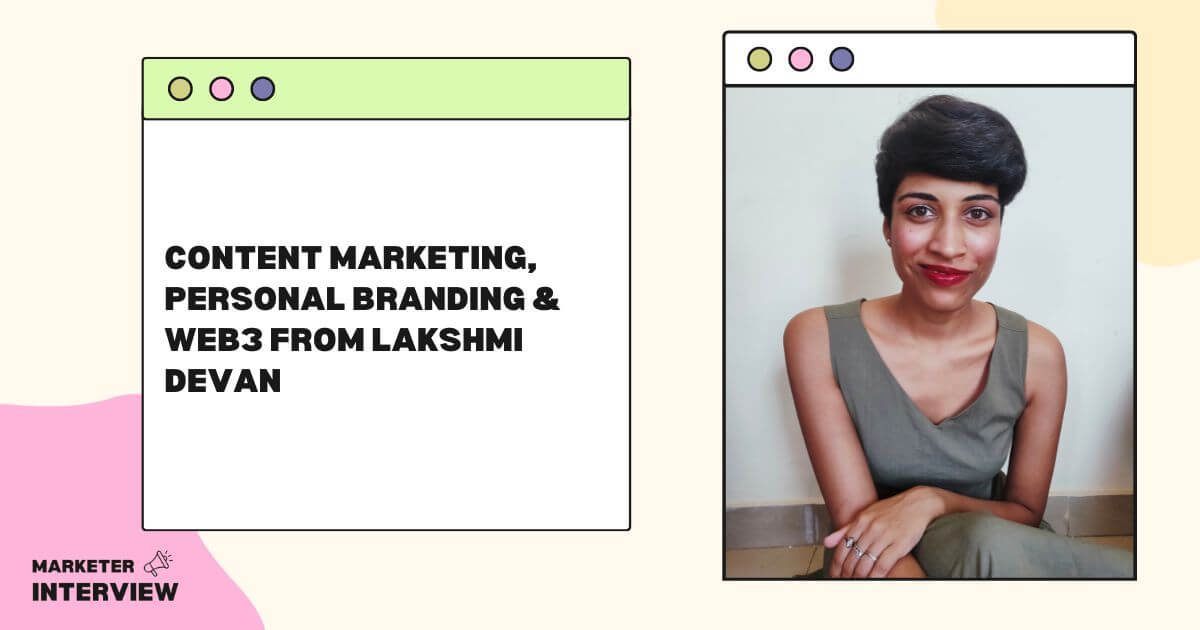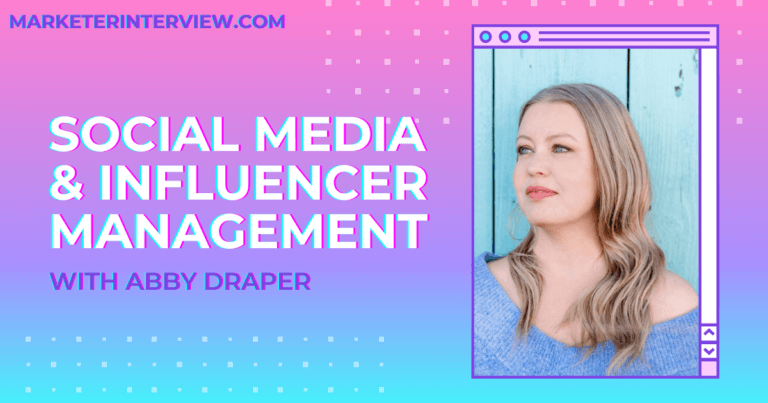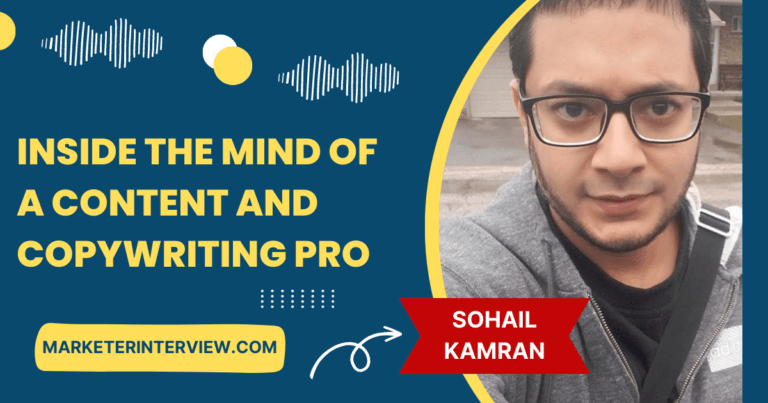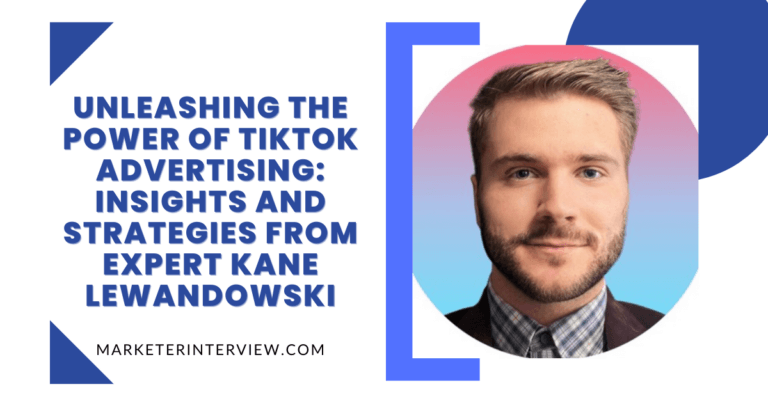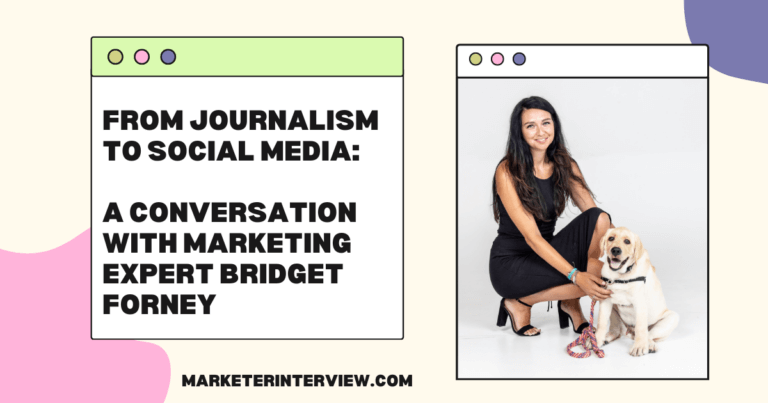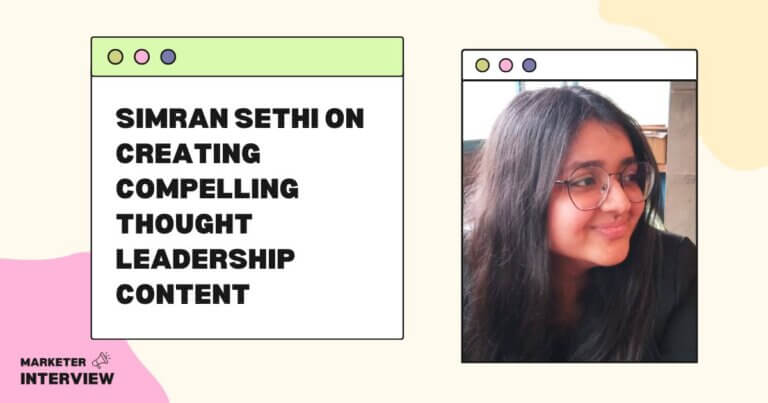Content Marketing, Personal Branding & Web3 from Lakshmi Devan
Welcome to Marketer Interview!
In this edition, we’re excited to chat with Lakshmi Devan, the Marketing Director at WOW Summit and Communications Lead at Turn.io.
Lakshmi is a talented marketer with extensive experience across different industries, including FMCG, fashion, health technology, SaaS, Web3, and AI.
With a unique superpower of translating product roadmaps into value propositions and brands that resonate with users, Lakshmi is recognized as one of the top 10 LinkedIn influencers to follow by the Indian Business Council and has been honored as an Iconic Woman Creating a Better World by the Women Economic Forum, among other accolades.
This interview will discuss Lakshmi’s expertise in content marketing, personal branding, Web3 marketing vs. Web2 marketing, leadership, the values that bring results, and her experience living with PTSD and anxiety.
Contents
- 1 Please tell us a bit about your marketing journey. How did you develop your unique skill set?
- 2 What are some of the biggest challenges you’ve faced in your career? How have you overcome them?
- 3 How do you approach building and maintaining a strong personal brand as a marketer?
- 4 How do you see Web3 marketing evolving in the coming years? What opportunities does it present for marketers?
- 5 In your experience, what are some of the essential qualities that make a great leader in the marketing industry?
- 6 What role do values play in your work as a marketer? How do you ensure that your marketing campaigns align with your values?
- 7 How do you stay up-to-date with the latest marketing trends and technologies?
- 8 Can you walk us through some of the tools and software you rely on to do your job effectively?
- 9 What advice do you have for aspiring marketers just starting their careers?
Please tell us a bit about your marketing journey. How did you develop your unique skill set?
I think I equally blame and give credit to the fact that I’m a startup baby. From the beginning of my career, where I started with a digital marketing startup and worked with brands like Fanta and Ford, to now at Turn.io, I’ve always worked with organizations that are either startups or function with the values and mindset of one.
So, you go way beyond your “job description” and learn many new skills. From the beginning, you learn to be agile, versatile (and restless!)
Secondly, I think it’s the fact that when you get lucky enough to change industries and geographies, as I did, it’s a non-stop boot camp.
Is it exhausting? Hell yes. Is it worth it? Also, 100% yes.
What are some of the biggest challenges you’ve faced in your career? How have you overcome them?
Some of the biggest challenges I’ve encountered in my career are not even related to marketing itself but are mostly culture-related. For example, racism or sexism at work. Yes, still rampant, just sneakier these days since people don’t want to be called out.
I’ve openly spoken about it on Linkedin and built quite a community, which means people relate to it. Additionally, of course, within my power, whenever I had the chance to lead by example, I jumped at the opportunity – nothing like setting an example.
I talk about issues like discrimination, diversity, inclusion, etc., has been the best filter for brands/people. But, suppose I post about something, and somebody writes to me acting defensive, even though I’ve never mentioned them in my post. I can spot the guilty conscience from a mile away.
How do you approach building and maintaining a strong personal brand as a marketer?
I’ve launched a course on personal branding on Graphy, and it’s based on my life and learnings. At my agency, Queen Bee Marketing Collective, it is what we specialize in.
Here’s my take on building and maintaining a strong personal brand:
Building and maintaining a solid personal brand takes effort and intentionality, but it’s worth it.
To create a memorable brand, define your unique value proposition and identify your target audience. Then, consider your strengths, skills, and experiences that set you apart and align them with your personal and professional goals.
Next, create a consistent image and message across all your social media profiles and online presence. Use high-quality photos, a professional tone, and engaging content that reflects your brand’s values and personality.
It’s also essential to network and build relationships with other industry professionals, attend conferences and events, and share your expertise by creating content and speaking on relevant topics.
Finally, be authentic and genuine in your interactions, communicate your brand’s story, and keep up with industry trends and best practices.
With persistence and focus, you can build a solid personal brand that opens doors, attracts opportunities, and creates a lasting impression.
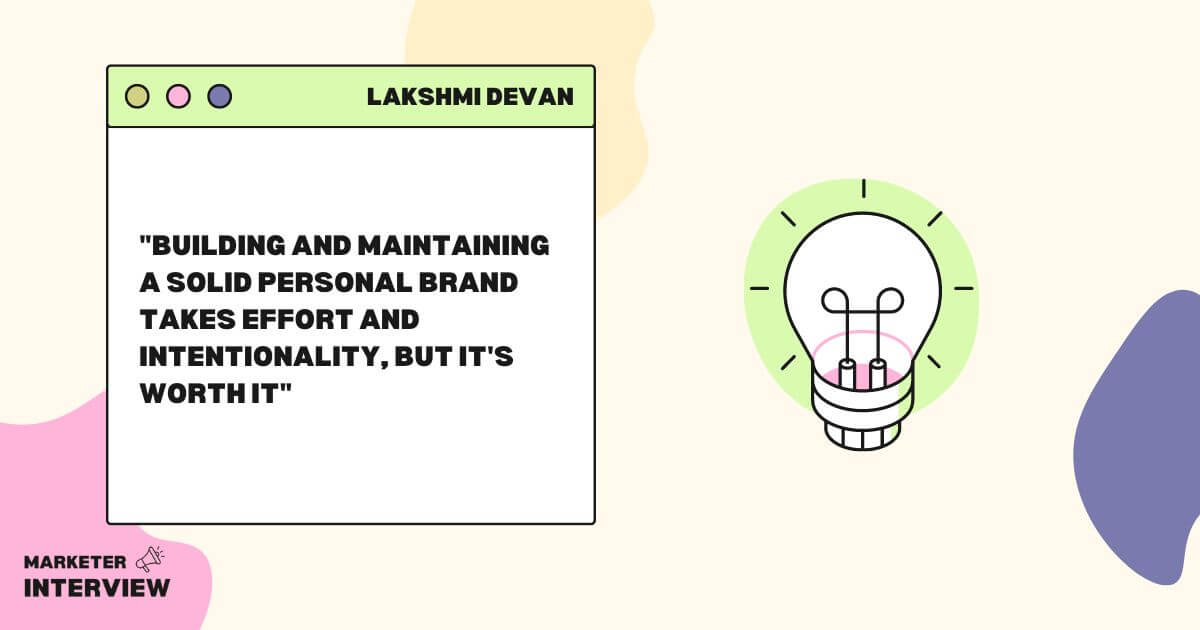
How do you see Web3 marketing evolving in the coming years? What opportunities does it present for marketers?
Web3 marketing is expected to undergo significant changes in the next few years, even months, to be honest.
With the advent of decentralized applications (DApps) and blockchain technology, brands can create more personalized and engaging customer experiences. In addition, these experiences will be more transparent, secure, and private, allowing for greater trust between brands and consumers.
Web3 marketing will also see a shift towards more user-centric approaches, where consumers will have more control over their data and be able to monetize their attention. This will lead to more targeted and relevant marketing messages, resulting in higher engagement and conversions.
As blockchain technology matures, we expect to see Web3 marketing become more mainstream and integrated into traditional marketing channels. As a result, the future of Web3 marketing is exciting, and businesses that adopt this technology early on will have a competitive advantage in the marketplace.
For marketers, this means that in the world of Web3, if you have a genuinely strong product that offers equally robust incentives to users, you have a high chance of winning against substandard products that may have huge budgets to shell out on fancy ads or collaborations.
In your experience, what are some of the essential qualities that make a great leader in the marketing industry?
Marketing is just like any other industry, so I want to focus instead on qualities that make a great leader in any and every organization, especially in the post-pandemic world.
My top qualities that turn a leader into a legend are:
Adaptability: Leaders must quickly adapt to changing circumstances, be flexible in their approach, and be willing to pivot when necessary.
Resilience: Leaders must bounce back from setbacks, learn from their experiences, and progress in adversity.
Empathy: Leaders must understand the needs and concerns of their employees, customers, and stakeholders and respond with compassion and sensitivity.
Strategic Thinking: Leaders must be able to think critically and strategically, anticipate future trends, and plan for their organization’s long-term success.
Collaboration: Leaders must work effectively with diverse teams, foster collaboration and cooperation, and build strong stakeholder relationships.
Digital Fluency: Leaders must be able to leverage technology to drive innovation, improve efficiency, and enhance the customer experience.
Agility: Leaders must be able to make quick decisions based on incomplete information, take calculated risks, and continuously adapt to changing circumstances.
Overall, leaders in the post-pandemic world must be agile, adaptable, and resilient, with a strong focus on empathy and collaboration, to navigate the challenges and opportunities of the new normal.
Despite working in tech and Web3, I always maintain a human-first mindset, and it’s been a massive win for me so far.
What role do values play in your work as a marketer? How do you ensure that your marketing campaigns align with your values?
My personal and professional values are huge in everything I do, including the campaigns I create and the brands I help build.
I’ve spoken about some fundamental values just now, and I think it would be fair to look at how these values can meet a company’s values halfway to realize a powerful brand.
Defining your values is critical in building a brand that truly represents who you are. Therefore, starting by taking a personal inventory of the core beliefs and principles that guide your business is essential.
Once you have a clear understanding of your values, you can develop a marketing strategy that aligns with your mission and reflects the essence of your brand.
Conducting a values audit is an essential next step. But first, you’ll want to review your existing marketing materials and campaigns to ensure they reflect your values and are consistent with your brand message.
Establishing clear guidelines and policies that reflect your values is another crucial step. This will help ensure your marketing team is working towards the same goals and values.
Finally, it’s essential to monitor and measure the impact of your marketing campaigns to ensure they align with your values and resonate with your target audience.
By staying true to your values and mission, you can build a strong brand identity and establish a deep connection with your customers.
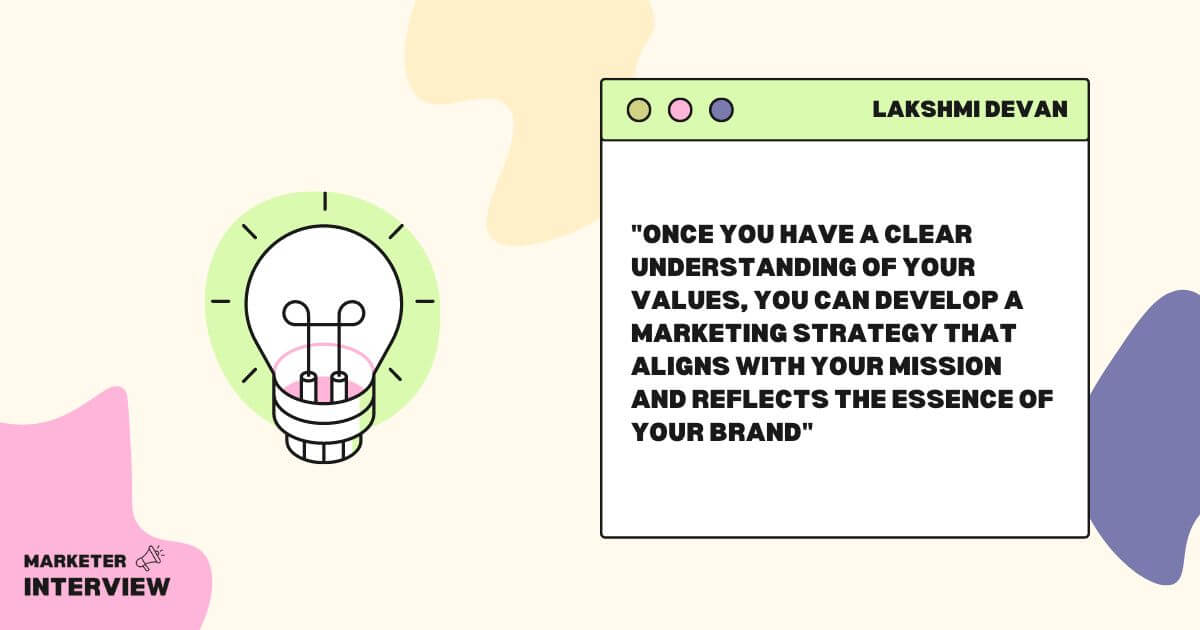
How do you stay up-to-date with the latest marketing trends and technologies?
I read a lot, simple!
I block 60 minutes on my calendar every day to spend on research and reading, and Fridays are reserved for reflections and team brainstorming sessions, where we all end up teaching each other something.
Can you walk us through some of the tools and software you rely on to do your job effectively?
You must have the right weapons to be a boss in the game. So I’m about to drop some knowledge on the essential free tools that all the greats swear by:
Canva: If you want to create eye-catching graphics without any design experience, Canva is your go-to. With tons of templates and design options, you’ll have professional-looking visuals in no time.
Hootsuite: Managing multiple social media accounts is a nightmare, but Hootsuite makes it a breeze. Schedule posts, track your mentions, and keep tabs on your social media performance all in one place.
Google Analytics: Want to know who’s visiting your website and what they’re doing? Google Analytics is the key to unlocking those insights. Track your traffic, monitor page performance, and discover where your visitors are coming from.
Hubspot CRM: Thanks to Hubspot CRM, customer relationship management doesn’t have to be a headache. Keep all your customer data in one place, automate your sales and marketing processes, and stay on top of your sales pipeline.
Mailchimp: Remember to let your email campaigns fall flat. With Mailchimp, you can design custom templates, segment your email list, and track your performance. Your subscribers will thank you.
What advice do you have for aspiring marketers just starting their careers?
To all the young marketers out there, don’t let anyone else define your worth. It can be a harsh lesson to learn, but once you realize that you have the power to determine your value, it’s liberating.
Take the time to recognize your strengths and worth; don’t let anyone else’s opinions bring you down. Believe in yourself and your abilities; don’t be afraid to take risks and pursue your passions.
Don’t let anyone else tell you what you’re capable of or worth. It may take some time to internalize this, but it’s seriously life-changing once you do.
Instead, choose to see yourself positively and recognize your strengths and values. Then, believe in yourself, and others will follow suit.
This powerful realization can lead you to great success and happiness. So go ahead and take control of your self-worth – you’ve got this!
